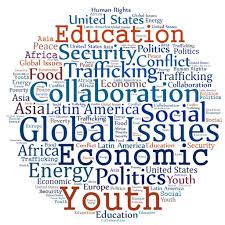Ethical Global Social Service Governance: A Human Rights-Based Approach
Effective global governance of social services is paramount in our interconnected world, directly impacting individual and societal well-being. The pursuit of the Sustainable Development Goals necessitates a human rights-based approach to social service governance. This article analyzes the crucial interplay of human rights and ethics in fostering global solidarity and sustainable development, utilizing relevant theories and frameworks. Key concepts include: human rights (as enshrined in international human rights law, emphasizing dignity, equality, and non-discrimination); ethical governance (incorporating accountability, transparency, and participation); and sustainable development (integrating social, economic, and environmental dimensions). We will explore these concepts through the lens of deontological ethics, Rawls' theory of justice, deliberative democracy, Sen's capabilities approach, and principles of intergenerational equity.
1. Foundational Principle: Human Dignity and Rights: Ethical social service governance is grounded in the inherent dignity of all individuals – a cornerstone of human rights law (e.g., the Universal Declaration of Human Rights). This intrinsic worth necessitates the protection of all fundamental human rights (civil, political, economic, social, and cultural). A deontological ethical perspective underscores the inherent moral duty to respect and uphold these rights, forming the ethical basis for just and inclusive societies. This principle acts as a compass, guiding all subsequent considerations in social service provision.
2. Equity and Non-discrimination: Human rights demand equality and the eradication of discrimination. Equitable access to social services, irrespective of individual characteristics (race, gender, religion, socioeconomic status), is crucial for social cohesion and reducing inequality. Rawls’ theory of justice as fairness provides a framework for achieving this, emphasizing the need for fair distribution of resources and opportunities. Addressing systemic inequalities requires not only dismantling discriminatory barriers but also proactively promoting equal opportunities through intersectional analyses to understand the interplay of various forms of discrimination and targeted policy interventions.
3. Participatory Governance and Empowerment: Ethical governance requires the meaningful participation of individuals and communities in decisions affecting their lives. This participatory approach, grounded in deliberative democracy theory, fosters ownership and responsibility, resulting in more effective and sustainable social services. Active community engagement ensures services are relevant, responsive, and tailored to specific needs, promoting self-determination and empowerment. Mechanisms such as participatory budgeting and citizen advisory boards can facilitate this engagement, effectively operationalizing the principles of deliberative democracy.
4. Accountability, Transparency, and the Rule of Law: Upholding human rights and ethical standards demands accountability and transparency. Robust mechanisms for redress and oversight are essential. The rule of law provides a framework for equitable and predictable social service delivery, adhering to established legal and regulatory standards. This builds public trust, improves service delivery, and provides recourse for violations. Independent oversight bodies and strong anti-corruption measures are crucial for ensuring accountability and promoting justice within the system.
5. Professional Ethics and Codes of Conduct: Social service professionals must adhere to robust codes of ethics encompassing confidentiality, impartiality, and beneficence. These codes serve as ethical decision-making frameworks in challenging situations, maintaining public trust and mitigating ethical dilemmas. Continuous professional development and ethical reflection are crucial for upholding these standards, ensuring the integrity of the profession and minimizing potential ethical conflicts.
6. Prioritizing Vulnerable Populations: Vulnerable populations (children, the elderly, persons with disabilities, marginalized groups) require special attention and tailored services. A rights-based approach prioritizes their needs and safeguards them from exploitation and harm. Sen's capabilities approach provides a framework for assessing and addressing their unique requirements for well-being, promoting their inclusion and participation in society.
7. Sustainable Development and Environmental Considerations: Ethical considerations extend to environmental sustainability. Sustainable development practices safeguard the rights of future generations to a healthy environment. Integrating environmental concerns into social service planning ensures long-term well-being, aligning with principles of intergenerational equity. This necessitates evaluating the ecological impact of social service interventions and adopting environmentally responsible practices.
8. Global Collaboration and Knowledge Sharing: Upholding human rights fosters global unity and collaboration. International cooperation, including the exchange of best practices and lessons learned, strengthens global governance and improves social service delivery. International organizations play a pivotal role in facilitating this collaboration, promoting the sharing of expertise and resources across national borders.
9. Investing in Capacity Building and Education: Effective global governance requires skilled professionals. Investment in education and training is vital for building capacity, including training in human rights law, ethical frameworks, and participatory governance. This investment in human capital is essential to facilitate the implementation and monitoring of ethical and effective social service systems.
Conclusion and Recommendations: Effective global social service governance necessitates a firm commitment to human rights and ethical principles. Integrating principles of dignity, equity, participation, accountability, and sustainability is crucial for building a world that values the well-being of all its citizens. Strategic investments in capacity building, targeted awareness campaigns, intersectoral collaboration, and the continuous adoption of best practices are essential for achieving equitable, inclusive, and ethically sound social services. Future research should focus on the practical application of these principles across diverse contexts, developing innovative approaches to enhance the effectiveness of global social service governance. Continuous monitoring and evaluation are imperative to adapt and improve social service systems to meet evolving societal needs. A comprehensive, multi-faceted strategy, incorporating policy reforms, capacity development, and robust monitoring mechanisms, is crucial for realizing the vision of equitable and ethical social services globally. A shift towards a truly rights-based approach, coupled with transparent and accountable governance structures, can facilitate significant progress in achieving the SDGs.
Reader Pool: How can we best ensure the equitable distribution of resources and the effective implementation of participatory governance models within the context of global social service delivery?


